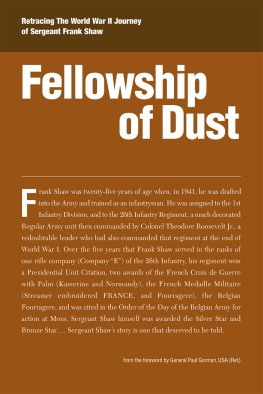William Shaw - Fellowship Of Dust: Retracing the WWII Journey of Sergeant Frank Shaw
Here you can read online William Shaw - Fellowship Of Dust: Retracing the WWII Journey of Sergeant Frank Shaw full text of the book (entire story) in english for free. Download pdf and epub, get meaning, cover and reviews about this ebook. year: 2021, publisher: Gatekeeper Press, genre: Non-fiction. Description of the work, (preface) as well as reviews are available. Best literature library LitArk.com created for fans of good reading and offers a wide selection of genres:
Romance novel
Science fiction
Adventure
Detective
Science
History
Home and family
Prose
Art
Politics
Computer
Non-fiction
Religion
Business
Children
Humor
Choose a favorite category and find really read worthwhile books. Enjoy immersion in the world of imagination, feel the emotions of the characters or learn something new for yourself, make an fascinating discovery.
- Book:Fellowship Of Dust: Retracing the WWII Journey of Sergeant Frank Shaw
- Author:
- Publisher:Gatekeeper Press
- Genre:
- Year:2021
- Rating:3 / 5
- Favourites:Add to favourites
- Your mark:
Fellowship Of Dust: Retracing the WWII Journey of Sergeant Frank Shaw: summary, description and annotation
We offer to read an annotation, description, summary or preface (depends on what the author of the book "Fellowship Of Dust: Retracing the WWII Journey of Sergeant Frank Shaw" wrote himself). If you haven't found the necessary information about the book — write in the comments, we will try to find it.
I began this project for personal reasons: my uncle had made an enormous personal sacrifice for his family and his country; yet, because of his silence, no one in my family ever fully knew what he endured. As the last living relative who knew him, I felt a responsibility to rescue his story from the shadows before it disappeared forever and to preserve it as a source of pride for my family and me.But a second reason for telling my uncles story materialized as I assembled the details of his journey. I came to realize that while many GIs experienced extensive combat operations or the trials of being held in a POW camp, very few men survived the amount of combat my uncle experienced and six months in a POW camp. Franks five-year wartime journey, which included three monumental amphibious invasions, six major battle campaigns, and six months in three different POW camps, was breathtaking in scope. The odds against his surviving all this, or being seriously wounded out of the war, are almost incalculable.Despite the unusual scope of Sergeant Shaws tour of duty, his day-to-day adventures are quite typical of what tens of thousands of combat infantrymen experienced during WWII. To that extent, the character who emerges in this story is a composite or representative figure, an American Odysseus, whose mission of extraordinary historical significance, requires him to define himself through trial, suffering, courage, and perseverance before he returns home in triumph.But the similarity ends at the triumphant return. Earlier civilizations celebrated their returning warriors at ceremonial feasts. These men were expected to show their wounds and relate their adventures to their countrymen so bards might record them for posterity. Such rituals insured the warrior a rightful place in history, enshrined his virtues, and shed his reflected glory on his community. No such salutary ritual greeted a battered Frank Shaw when he returned from the war; no one saw his wounds or took his testimony. And his silence consigned his deeds to the shadows of time and dimming memory. But the ancient customs were correct the heros deeds are not his alone. They are his legacy to his family and his country, and they deserve to be honored not shrouded. Therefore, since Sergeant Frank Shaw, like so many of his World War II comrades in arms, would not, and did not, tell his story, I did.
William Shaw: author's other books
Who wrote Fellowship Of Dust: Retracing the WWII Journey of Sergeant Frank Shaw? Find out the surname, the name of the author of the book and a list of all author's works by series.











